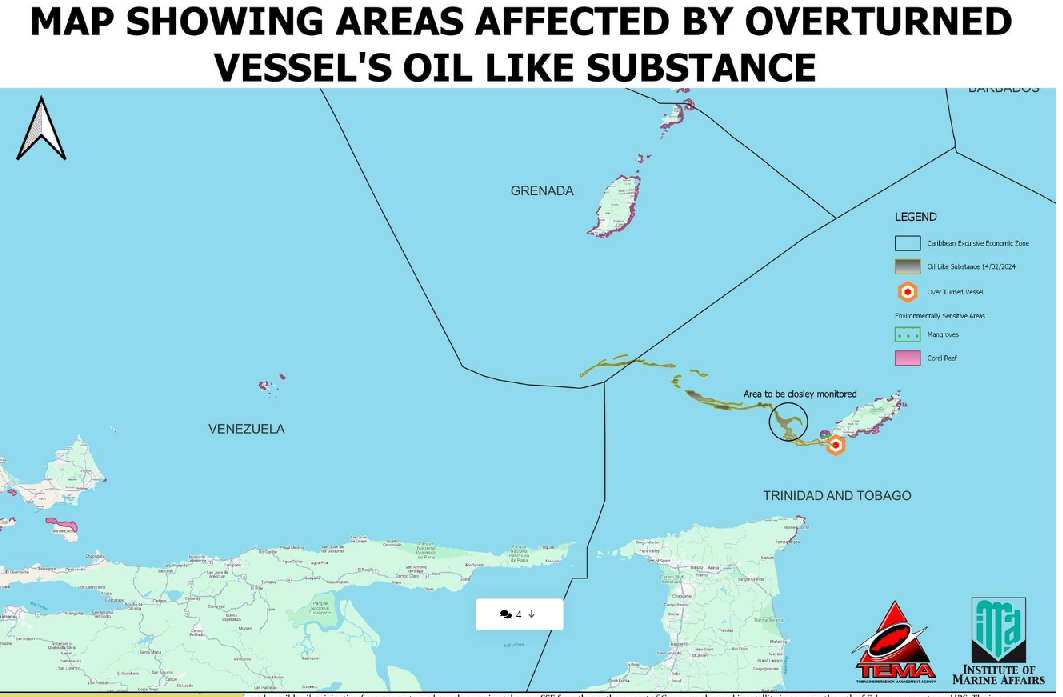(Trinidad Guardian) Grenada has contacted the Caribbean Disaster Emergency Management Agency and other partners, as possible oil from the Tobago oil spill has entered their marine area of responsibility.
On Wednesday, new satellite data analysed by the Tobago Emergency Management Agency, captured at 5.37 am, indicated the possible oil slick has extended approximately 63 nautical miles or 118 kilometres west-northwest of Tobago.
The extent of the slick now extends approximately 30 kilometres outside Trinidad and Tobago’s Economic Exclusive Zone (EEZ), the marine area for which T&T is responsible. According to TEMA, this possible oil slick originates from the overturned vessel, Gulfstream, approximately 150 metres off the southern coast of Tobago and is nearly 78 nautical miles or 144 kilometres in length.
TEMA also said they have a high confidence level “attributed to the known suspected point source,” meaning the slick comes from the capsised ship.
TEMA added, “Variations in slick thickness were noted, and a thin oil-like substance was present in the imagery. Drone surveillance and ground truthing were also conducted to increase the confidence level.”
TEMA has requested “advanced aerial truthing” to be conducted via a flyover by the T&T Air Guard.
Meanwhile, Grenadians are already preparing for the possibility of oil arriving on their coastlines.
In a media release, Grenada’s National Disaster Management Agency (NaDMA) said they have “evoked the tenets of its oil spill hazard-specific protocol and contacted the Caribbean Disaster Emergency Management Agency (CDEMA), as well as other local and regional partners to assist as a precautionary measure.”
Yesterday, NaDMA convened an emergency meeting of their National Oil Spill Committee, a sub-committee of the National Emergency Advisory Council, to brief members and make preparations should any response arise.
The Grenada government is currently in contact with T&T’s Ministry of Foreign and Caricom Affairs “to ascertain the extent to which the oil slick is likely to affect Grenada.”
Guardian Media contacted Grenada Prime Minister Dickon Mitchell and his press office but got no response up press time yesterday.
However, in a brief statement to Guardian Media, Foreign and Caricoms Affairs Minister Dr Amery Browne said, “The Ministry of Foreign and Caricom Affairs continues to fulfil its responsibilities in response to the oil spill, within the overall coordinated actions of the Government and other relevant authorities. A comprehensive statement will be made by the Government tomorrow [today], which will address and clarify the actions that are underway.”
As oil continues to flow out of Gulfstream for the ninth day, fishing vessels from Scarborough to Black Rock have remained grounded.
All Tobago Fisherfolk Association president Curtis Douglas explained that once oil washed up on shore in Tobago, he called for a grounding of boats in and around areas that had been and potentially could be affected.
He said the oil could damage and adversely impact boats, but for those who fish in the areas where oil moved, “the barracuda, snappers and kingfish will be damaged”.
“I don’t want anyone to get infected, so I advised them to pull their vessels up until further notice because I don’t want anyone to get sick.”
With many fisherfolk unable to ply their trade, Douglas said the issue of compensation lies in the hands of the Prime Minister.
“I think the Prime Minister has a responsibility and ownership to assist the fisherfolk in their need because they have children to feed, a family to mind. If we pull up, we think there should be some form of help.”
Douglas added, “This is a national disaster, and I believe a national disaster means that the Prime Minister of Trinidad and Tobago should do his best to ensure that fisherfolks are duly compensated in whatever and however, they were affected by an incident that they have no ownership or responsibility for.”
Tobago’s fisherfolk have complied with the order to remain out of the water, but Douglas said nearly 30 fisherfolk are using their boats to assist in clean-up efforts at sea.






